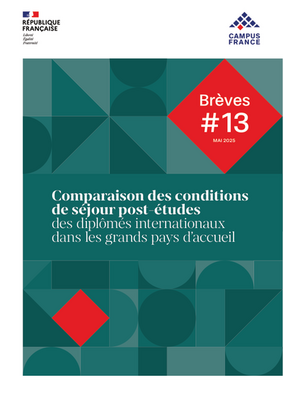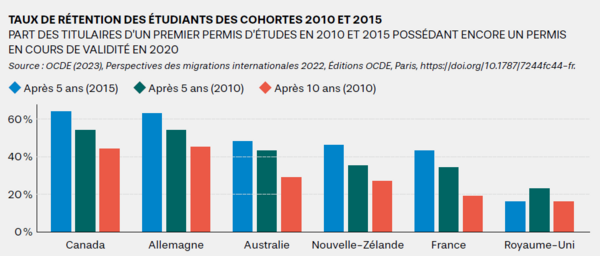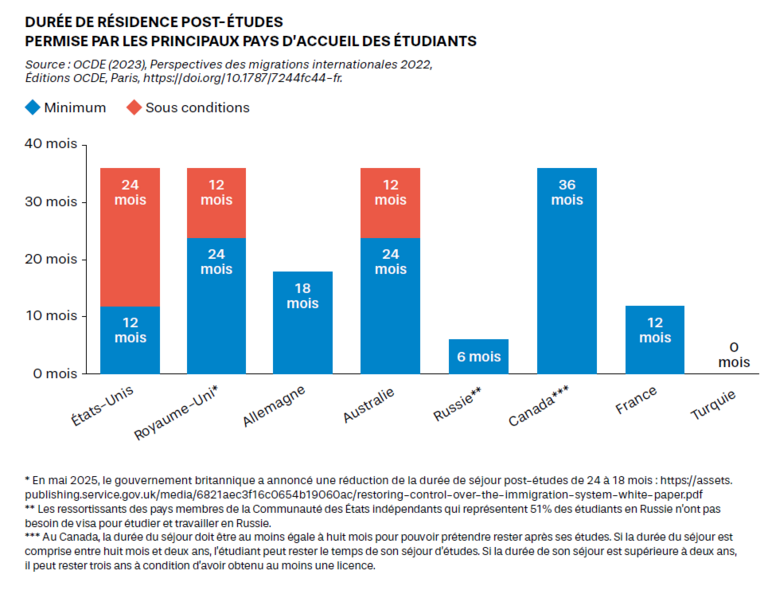
Post-Study Pathways: A Key Factor in Host Countries’ Attractiveness
Job opportunities after graduation are a major consideration when international students choose where to study. So what do leading host countries offer in terms of post-study options? How does France compare to its European and OECD peers? And what should employers know when looking to hire international graduates? Campus France has released a new “Brève” report comparing post-study residence policies for international graduates across major destination countries.

The report looks at the eight leading countries for degree-seeking international students [1] and compares their post-study arrangements. It first examines countries outside the European Union, each with its own regulatory framework, then shifts to EU member states, which follow common legislation but apply it in different ways.
International Student Mobility on the Rise
Global student mobility has seen steady growth. Between 2012 and 2022, the number of international students pursuing full degrees abroad rose by 68% [2]. Many of these students want to stay on after graduation to gain professional experience, boost their employability, and build an international career.
For host countries, these graduates represent a valuable pool of skilled talent that can help meet labor market needs. In the research field, they also strengthen international cooperation in science and technology.
Why Foreign Graduates Matter More Than Ever
With aging populations, major host countries increasingly see international students as part of the solution to their workforce shortages. Over the past decade, they have introduced policies to attract new students and make it easier for graduates to remain after their studies.
OECD data show that recent international student cohorts are staying in higher numbers, thanks to these post-study integration efforts made by governments.

The EU Bets on Student Mobility
Faced with record-low unemployment, widespread job vacancies, and demographic decline, the European Commission issued a set of recommendations in November 2023 to tackle skills shortages across the EU. Among its goals: increasing the share of young Europeans with international experience to 25% by 2030.
The Draghi Report, commissioned by the European Commission in November 2024, also highlights growing shortages in STEM fields (science, technology, engineering, and mathematics) and warns that these gaps are likely to worsen.
Post-Study Options: A Decisive Factor for Students
Europe remains the top destination for international students, but still struggles to retain enough graduates to meet its demand for skilled labor. Post-study residence rules vary from country to country and play a key role in influencing student decisions.
Depending on the destination, between 47% and 76% of international students consider the ability to work after graduation an important factor in choosing where to study.
Post-Study Stay Duration: A Powerful Retention Tool
With the exception of Turkey, all eight of the world’s leading study destinations have put in place pathways allowing international graduates to stay and look for work.
These allow for stays ranging from 6 months to 3 years[3], depending on the country.
Such policies help retain international talent and integrate graduates into the local workforce.
On average, the theoretical maximum duration of post-study residence in these eight countries is 22.5 months[4]. Among the six Western countries in the group, this rises to 29 months.
Anglophone countries—such as the United States, United Kingdom, Australia, and Canada—are particularly generous, offering up to 36 months, though this often depends on the level of qualification or the student’s field of study.
In the European Union, a minimum of 9 months of post-graduation stay is mandated by EU law, but member states are free to go beyond this. Estonia stands out by imposing no maximum limit, allowing graduates to stay as long as they wish. Finland, Ireland, and Germany also offer extended post-study stays of 24 months and 18 months respectively. France allows graduates to stay for up to 12 months to find a job or start a business.
The more open a country is to allowing graduates to stay on, the higher its retention tends to be. OECD countries with the highest retention rates offer post-study stays of 18 months or more—notably Canada, Germany, and Australia.
There is also a positive correlation between the number of international students a country attracts and the length of its post-study residence options, even though stay duration is only one attractiveness factor.

[1] United States, United Kingdom, Germany, Australia, Russia, Canada, France, Turquey.
[2] Unesco Institute of statistics, October 2024.
[3] 6 months duration in Russia and non-existent in Turquey.
[4] Article 25 of the European directive 2016/801.
Recommended News




















































